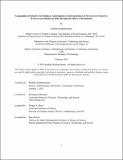Geographies of Selective Surveillance: Analyzing the Lived Experiences of Street-Level Trans Sex Workers and Muslims in India through the Matrix of Domination
Author(s)
Radhakrishnan, Radhika
DownloadThesis PDF (837.5Kb)
Advisor
Banerjee, Dwaipayan
Terms of use
Metadata
Show full item recordAbstract
In this paper, I present a study of public and private CCTV surveillance of urban public spaces in India, which I term as ‘geographies of selective surveillance’ — areas where state power is discretionarily exercised and abused, and the presence of the state is experienced principally through police pickets and everyday violence unleashed on marginal occupants, rather than by access to civic amenities and systems of justice. I analyze these experiences of surveillance from the standpoint (Harding, 1992) of minoritized communities of street-level trans sex workers in Kolkata and Muslims in Mumbai. I then situate these experiences within the Matrix of Domination (Collins, 1990), a theoretical framework that explains how systems of power are configured. Defining empowerment as the power to gain control of and/or benefit from a scenario by weakening the Matrix of Domination, I analyze the structural determinants that make surveillance empowering or disempowering for these communities. I find that on the one hand, surveillance can be an empowering tool for minoritized communities as evidence of harm and innocence in cases of false accusations or when police officials typically refuse to believe their experiences due to discriminatory attitudes. On the other hand, surveillance also offers new opportunities for the private exploitation of the instruments of state power through corruption as well as community-based moral policing to be done with greater success and efficiency. I argue that what ultimately determines how surveillance is experienced is not laws and policies, but rather how power is discretionarily exercised on the ground, refracted through the influence of cultural and political beliefs, and discourse.
Date issued
2025-02Department
Massachusetts Institute of Technology. Program in Science, Technology and SocietyPublisher
Massachusetts Institute of Technology